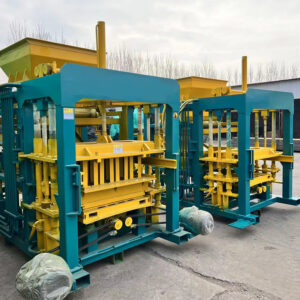
Image source :Aiweiblockmachine
Brick Block Machine Manufacturer Offers Tailored Solutions for Diverse Construction Needs
In the ever-evolving world of construction, flexibility and adaptability have become paramount. As construction projects become increasingly complex and diverse, the demand for specialized machinery that can cater to a wide range of needs has grown exponentially. A trailblazing brick block machine manufacturer has emerged as a frontrunner in meeting this demand, offering customized solutions that align with the unique requirements of construction projects worldwide. This article delves into the significance of tailored solutions, explores the manufacturer’s approach, and examines the impact on the construction industry.
The Era of Customization
The one-size-fits-all approach is becoming obsolete in the modern construction landscape. With projects ranging from residential developments to commercial complexes and infrastructure ventures, construction needs have diversified immensely. Whether it’s adapting to local regulations, accommodating different building materials, or meeting specific design requirements, flexibility is key.
Recognizing this shift, the brick block machine manufacturer has pioneered a paradigm of customization. Instead of offering standardized machines, they focus on developing solutions that can be tailored to the unique demands of each project.
The Manufacturer’s Approach to Customization
The manufacturer’s commitment to tailored solutions is rooted in innovation, adaptability, and a deep understanding of the construction sector. Their approach encompasses a range of strategies to meet diverse construction needs:
1. Needs Assessment: Rather than assuming a one-size-fits-all approach, the manufacturer engages with clients to assess their specific needs. This involves understanding project scale, location, design specifications, available resources, and the desired outcome.
2. Modular Design: The manufacturer’s machines are built with modularity in mind. This allows for the seamless integration of components that suit the project’s requirements. Whether it’s adjusting the size of blocks, incorporating specific features, or adapting to regional building codes, the modular design facilitates customization.
3. Material Compatibility: Different projects require different building materials. The manufacturer ensures that their machines can accommodate a wide range of materials, from traditional clay bricks to eco-friendly concrete blocks.
4. Automation and Software Integration: Automation plays a pivotal role in modern construction machinery. The manufacturer offers software integration that can be customized to streamline production processes, optimize resource utilization, and enhance overall efficiency.
5. Collaboration with Clients: Open communication with clients is a cornerstone of the customization process. The manufacturer collaborates closely with project managers, engineers, and architects to ensure that the machines align perfectly with the project’s vision and goals.
6. Post-Sale Support: The commitment to customization doesn’t end with the sale. The manufacturer provides ongoing support to ensure that the machines continue to meet evolving project requirements.
Case Study: A Construction Project Transformed
Consider a case study of a large-scale mixed-use development project in an urban center. The project comprises residential towers, commercial spaces, and recreational areas. Each aspect of the development has unique construction needs, requiring specific types of blocks and bricks.
The manufacturer’s tailored approach comes into play here. By collaborating closely with the project team, they design and deliver brick block machines that can produce a variety of block sizes and types, including specialized façade blocks for the commercial spaces. The modular design allows for adjustments as the project progresses, ensuring that the machinery remains aligned with evolving construction needs.
As a result, the project not only meets its deadlines but also exceeds quality expectations. The tailored solutions provided by the manufacturer play a crucial role in shaping the project’s success.
Impact on the Construction Industry
The manufacturer’s commitment to tailored solutions has far-reaching implications for the construction industry:
1. Streamlined Efficiency: Customized machinery ensures that construction processes are optimized for maximum efficiency. This translates to shorter project timelines, reduced resource waste, and increased overall productivity.
2. Enhanced Quality and Safety: Meeting specific project needs ensures that the final product meets stringent quality standards. Moreover, machinery designed for a particular project minimizes the risk of accidents and errors, enhancing construction site safety.
3. Resource Optimization: Customized machinery eliminates the use of excessive resources that might occur with generic machines. This aligns with sustainable construction practices by minimizing waste and conserving materials.
4. Local Empowerment: In emerging markets and local communities, the availability of customized machinery empowers local industries and enhances their capacity to contribute to construction projects that meet international standards.
5. Innovation Catalyst: The focus on tailored solutions spurs innovation not only within the manufacturer’s offerings but also throughout the construction ecosystem. Architects, engineers, and contractors are inspired to explore new design possibilities knowing that machinery can be adapted to their vision.
Conclusion
The brick block machine manufacturer’s commitment to offering tailored solutions for diverse construction needs epitomizes the direction that the industry is heading. In a world where each construction project is unique, generic machinery falls short of expectations. The manufacturer’s approach is a testament to their agility, adaptability, and dedication to advancing construction practices.
As construction projects continue to push boundaries and explore new horizons, the role of tailored machinery becomes increasingly pivotal. This approach ensures that projects are not just built; they are crafted to perfection, meeting the highest quality standards and contributing to a more efficient, sustainable, and innovative construction industry.
